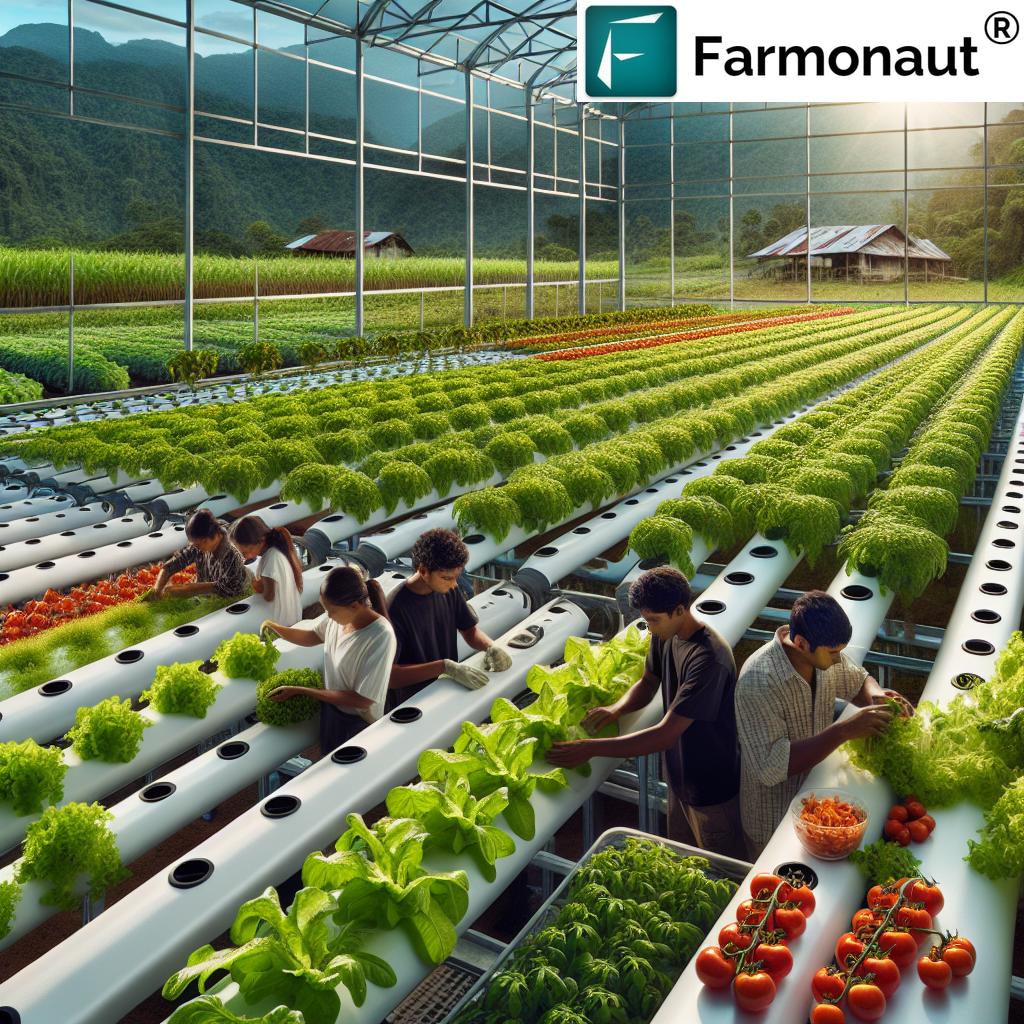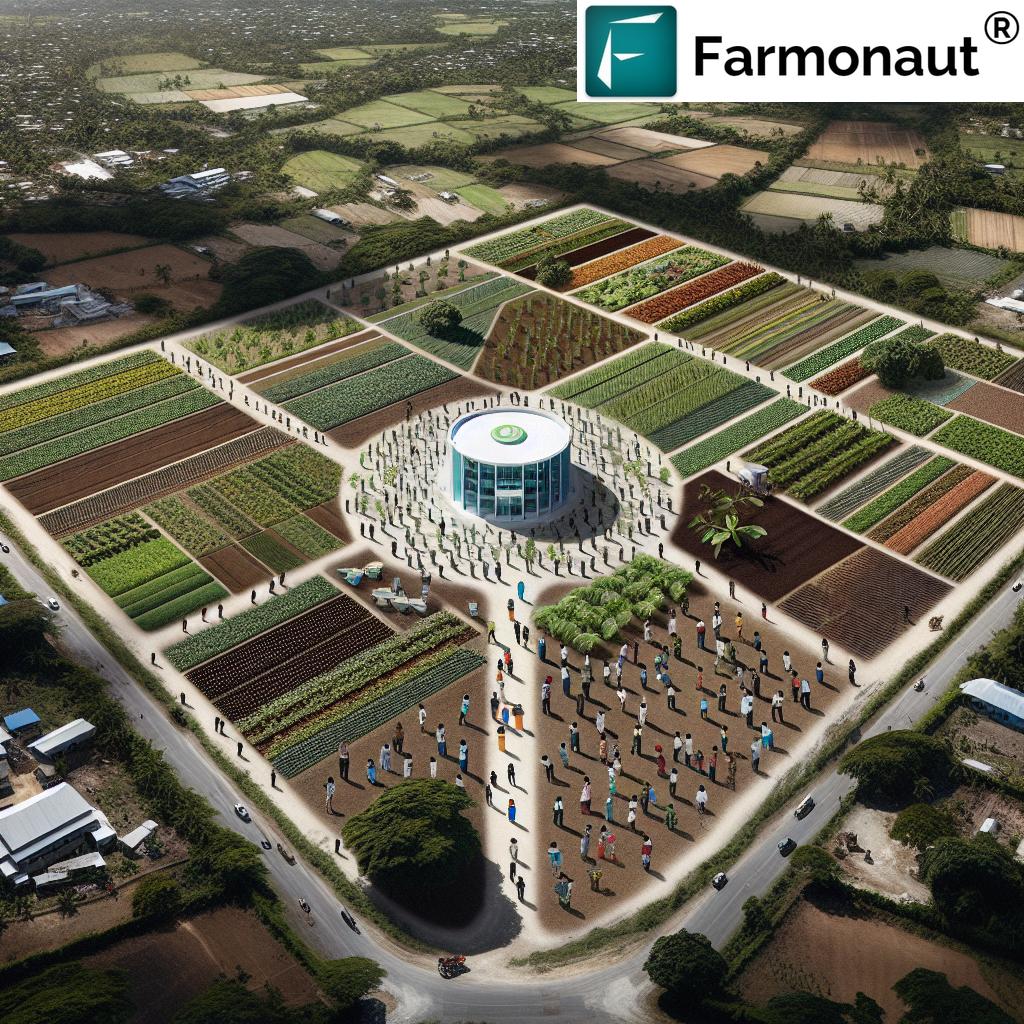Revolutionizing Jamaica’s Agriculture: Hydroponics and Youth Engagement for Economic Growth
“Jamaica’s agricultural sector debates focus on hydroponics, with potential to increase productivity by up to 400% compared to traditional farming.”
In the heart of the Caribbean, Jamaica stands at a critical crossroads in its agricultural journey. As we delve into the intricacies of the island’s farming landscape, we find ourselves amidst a swirling debate on how best to propel the nation’s agricultural sector into a new era of productivity and sustainability. At the forefront of this discussion is the revolutionary potential of hydroponics and the pressing need for youth engagement in agriculture. These elements are not just buzzwords but represent a fundamental shift in how we approach farming and economic development in Jamaica.
The Current State of Jamaica’s Agricultural Sector
Jamaica’s agricultural sector has long been a cornerstone of the nation’s economy, providing livelihoods for thousands and contributing significantly to food security. However, the industry faces numerous challenges that have hindered its growth and competitiveness on the global stage. Traditional farming methods, while steeped in cultural significance, often struggle to meet the demands of a rapidly changing world.
- Limited land availability
- Vulnerability to extreme weather events
- High production costs
- Inconsistent crop yields
- Aging farmer population
These factors have contributed to a decline in agricultural productivity and an increased reliance on imported food products. The situation calls for innovative solutions that can revitalize the sector and position Jamaica as a leader in modern, sustainable agriculture.
Hydroponics: A Game-Changer for Jamaican Agriculture
Enter hydroponics, a soil-less farming technique that’s gaining traction worldwide for its efficiency and adaptability. This method of growing plants using nutrient-rich water solutions offers a promising alternative to traditional farming practices in Jamaica.

The benefits of hydroponic farming for Jamaica are numerous:
- Increased Productivity: Hydroponic systems can yield up to 400% more produce per acre compared to traditional farming methods.
- Water Conservation: These systems use up to 90% less water than conventional agriculture, a crucial advantage in areas prone to drought.
- Year-round Production: Controlled environments allow for continuous crop growth, independent of seasonal changes.
- Reduced Pesticide Use: The controlled nature of hydroponic systems minimizes pest issues, leading to cleaner, healthier produce.
- Land Efficiency: Vertical hydroponic setups can maximize production in limited spaces, addressing Jamaica’s land scarcity issues.
By embracing hydroponics, Jamaica has the potential to transform its agricultural landscape, boosting productivity while conserving precious resources.
Youth Engagement: The Key to Agricultural Innovation
“Youth unemployment in Jamaica, currently at 20.6%, could be significantly reduced through increased engagement in modernized agriculture.”
The future of Jamaica’s agriculture lies in the hands of its youth. Engaging young people in the sector is not just about filling a labor gap; it’s about injecting fresh ideas, technological savvy, and entrepreneurial spirit into an industry ripe for innovation.

Here’s why youth engagement is crucial:
- Technological Adoption: Young farmers are more likely to embrace and implement new technologies like hydroponics and precision agriculture tools.
- Economic Opportunity: Agriculture can provide viable career paths for youth, reducing unemployment and stimulating economic growth.
- Innovation and Entrepreneurship: Young minds bring fresh perspectives, leading to innovative solutions in farming practices and agribusiness.
- Sustainability Focus: The younger generation often prioritizes sustainable practices, aligning with global trends towards eco-friendly agriculture.
- Bridging the Generation Gap: Youth involvement ensures the transfer of traditional knowledge while introducing modern techniques.
To foster youth engagement in agriculture, we need targeted initiatives that make farming attractive and accessible to young Jamaicans. This includes educational programs, mentorship opportunities, and access to resources and technologies that can make agriculture a rewarding career choice.
The Role of Technology in Modernizing Jamaica’s Agriculture
As we look towards the future of farming in Jamaica, technology plays a pivotal role in bridging the gap between traditional practices and modern innovations. Companies like Farmonaut are at the forefront of this agricultural revolution, offering cutting-edge solutions that can transform how we approach farming on the island.
Farmonaut’s satellite-based farm management solutions provide valuable tools for Jamaican farmers looking to optimize their operations:
- Real-time Crop Health Monitoring: Using multispectral satellite imagery, farmers can track vegetation health and soil moisture levels, enabling timely interventions.
- AI-powered Advisory Systems: The Jeevn AI system offers personalized recommendations based on real-time data, helping farmers make informed decisions about crop management.
- Resource Management Tools: These help in optimizing the use of water, fertilizers, and other inputs, crucial for sustainable farming practices in Jamaica.
By integrating these technologies, Jamaican farmers can significantly improve their productivity and sustainability, aligning with the nation’s goals for agricultural advancement.
To explore how Farmonaut’s technology can benefit your farming operations, visit their web application or download their mobile apps:
Comparative Analysis: Traditional vs. Hydroponic Farming in Jamaica
To better understand the potential impact of hydroponics on Jamaica’s agricultural sector, let’s compare it with traditional farming methods:
| Metric | Traditional Farming | Hydroponic Farming |
|---|---|---|
| Production Yield (per acre) | Lower | Up to 400% higher |
| Water Usage | High | Up to 90% less |
| Land Requirement | Extensive | Minimal (can be vertical) |
| Growth Cycle Duration | Longer, seasonal | Shorter, year-round |
| Labor Requirements | Higher | Lower, more specialized |
| Initial Investment | Lower | Higher |
| Operational Costs | Variable (weather-dependent) | More stable, potentially lower long-term |
| Environmental Impact | Higher (pesticides, soil erosion) | Lower (controlled environment) |
| Technology Integration | Limited | High (IoT, AI, automation) |
| Market Potential | Traditional markets | High-value, niche markets |
| Youth Appeal | Lower | Higher (tech-driven, innovative) |
This comparison highlights the significant advantages that hydroponic systems offer for Jamaica’s agricultural future, particularly in terms of resource efficiency, productivity, and appeal to younger generations.
Policy Implications and Government Initiatives
For Jamaica to fully harness the potential of hydroponics and youth engagement in agriculture, supportive policies and government initiatives are crucial. Here are some key areas that require attention:
- Investment in Infrastructure: Government support for building hydroponic facilities and modernizing existing farms.
- Education and Training Programs: Develop curricula that integrate modern agricultural techniques, including hydroponics, into schools and vocational training.
- Financial Incentives: Offer grants, subsidies, or tax breaks for farmers transitioning to hydroponic systems or young entrepreneurs starting agri-businesses.
- Research and Development: Allocate funds for agricultural research, focusing on adapting hydroponic techniques to Jamaica’s specific climate and crop varieties.
- Market Access: Facilitate connections between hydroponic farmers and local and international markets, potentially through trade agreements or export assistance programs.
These policy measures can create an enabling environment for the growth of hydroponic farming and encourage youth participation in the agricultural sector.
Challenges and Solutions in Implementing Hydroponics
While the benefits of hydroponics are clear, implementing this technology in Jamaica is not without challenges. Let’s explore some of these obstacles and potential solutions:
1. High Initial Costs
Challenge: Setting up hydroponic systems requires significant upfront investment.
Solution: Government-backed low-interest loans, public-private partnerships, and phased implementation strategies can help offset initial costs.
2. Technical Knowledge Gap
Challenge: Many farmers lack the technical expertise to operate hydroponic systems effectively.
Solution: Comprehensive training programs, partnerships with agricultural colleges, and ongoing support from agricultural extension services can bridge this knowledge gap.
3. Energy Dependency
Challenge: Hydroponic systems often rely on consistent electricity supply, which can be problematic in areas with unreliable power.
Solution: Integrating renewable energy sources like solar panels can provide a sustainable and reliable power supply for hydroponic operations.
4. Market Acceptance
Challenge: Some consumers may be skeptical of hydroponically grown produce.
Solution: Educational campaigns highlighting the benefits of hydroponics, such as reduced pesticide use and higher nutritional value, can help change perceptions.
By addressing these challenges head-on, Jamaica can pave the way for widespread adoption of hydroponic farming, revolutionizing its agricultural sector.
The Economic Impact of Agricultural Innovation
The adoption of hydroponics and increased youth engagement in agriculture has the potential to create a significant positive impact on Jamaica’s economy. Here’s how:
- Job Creation: Modern farming techniques can create new, skilled jobs in areas such as system maintenance, data analysis, and agri-technology.
- Export Opportunities: Increased production and quality of crops can open up new export markets, boosting foreign exchange earnings.
- Reduced Import Dependency: Higher local production can decrease reliance on imported produce, improving Jamaica’s trade balance.
- Rural Development: Investment in agricultural technology can stimulate economic activity in rural areas, reducing urban migration.
- Entrepreneurship Growth: The intersection of agriculture and technology creates opportunities for innovative startups and small businesses.
By embracing these changes, Jamaica can transform its agricultural sector into a modern, efficient, and economically vibrant industry.
Case Study: Successful Hydroponic Initiatives in Similar Contexts
While we don’t have specific case studies from Jamaica, we can look at successful hydroponic initiatives in similar Caribbean contexts to understand the potential impact:
Barbados: Urban Farming Revolution
In Barbados, urban hydroponic farms have been established to address food security issues. These farms have shown a 30% increase in crop yields while using 70% less water compared to traditional methods. The initiative has also attracted young entrepreneurs, creating new job opportunities in the agricultural sector.
Trinidad and Tobago: School Hydroponic Program
Trinidad and Tobago implemented a hydroponic program in schools, teaching students modern farming techniques. This initiative not only improved the schools’ access to fresh produce but also inspired many young people to pursue careers in agriculture and agri-technology.
These examples demonstrate the potential for hydroponics to transform agriculture in island nations similar to Jamaica, highlighting the possibilities for increased productivity, youth engagement, and economic growth.
The Role of Technology in Sustainable Farming
As we embrace hydroponics and other modern farming techniques, technology plays a crucial role in ensuring sustainability and efficiency. Farmonaut’s advanced solutions offer valuable tools for Jamaican farmers looking to optimize their operations:
- Satellite-Based Crop Monitoring: Real-time data on crop health allows for timely interventions, reducing resource waste and improving yields.
- AI-Powered Advisory: Personalized recommendations help farmers make data-driven decisions, optimizing resource use and crop management.
- Blockchain Traceability: Ensures transparency in the supply chain, adding value to Jamaican produce in international markets.
To explore how Farmonaut’s technology can benefit your farming operations, visit their web application or access their API for custom integrations.
The Future of Jamaican Agriculture
As we look to the future, the path forward for Jamaican agriculture is clear. By embracing hydroponics, engaging youth, and leveraging cutting-edge technology, the sector can overcome its current challenges and emerge as a leader in sustainable, productive farming. This transformation will not only ensure food security for Jamaica but also position the country as an innovative force in Caribbean agriculture.
Key areas of focus for the future include:
- Continued investment in hydroponic infrastructure and research
- Expansion of agricultural education programs with a focus on modern techniques
- Development of policies that support sustainable farming practices
- Creation of incentives for youth to enter the agricultural sector
- Promotion of Jamaica’s agricultural products in international markets
By committing to these priorities, Jamaica can build a resilient, productive, and sustainable agricultural sector that drives economic growth and provides opportunities for generations to come.
Conclusion
The revolution in Jamaica’s agriculture through hydroponics and youth engagement presents a unique opportunity to address long-standing challenges in the sector. By embracing innovative farming techniques, leveraging technology, and harnessing the energy and creativity of its youth, Jamaica can transform its agricultural landscape. This transformation promises not just increased productivity and sustainability, but also economic growth, job creation, and a renewed interest in farming among younger generations.
As we move forward, it’s crucial for all stakeholders – government, private sector, educational institutions, and farmers – to work together in implementing these changes. With the right support and initiatives, Jamaica’s agriculture can become a model of innovation and sustainability for the Caribbean and beyond.
The future of Jamaican agriculture is bright, green, and technologically advanced. It’s time to seize this opportunity and cultivate a new era of prosperity for Jamaica’s farmers and the nation as a whole.
FAQ Section
1. What is hydroponics and how does it differ from traditional farming?
Hydroponics is a method of growing plants without soil, using nutrient-rich water solutions instead. It differs from traditional farming by offering higher yields, using less water, and allowing for year-round production in controlled environments.
2. How can hydroponics benefit Jamaica’s agricultural sector?
Hydroponics can increase crop yields, conserve water, reduce pesticide use, and allow for farming in areas with limited arable land. This can boost Jamaica’s agricultural productivity and sustainability.
3. What role can youth play in modernizing Jamaica’s agriculture?
Youth can bring fresh perspectives, technological know-how, and entrepreneurial spirit to the agricultural sector. Their involvement is crucial for adopting modern farming techniques and driving innovation in the industry.
4. How does technology like Farmonaut’s solutions contribute to agricultural development?
Technologies like satellite-based crop monitoring and AI-powered advisory systems help farmers make data-driven decisions, optimize resource use, and improve crop yields, contributing to more efficient and sustainable farming practices.
5. What are the main challenges in implementing hydroponics in Jamaica?
The main challenges include high initial costs, the need for technical expertise, energy dependency, and potential market acceptance issues. However, these can be addressed through targeted policies, education, and support programs.
Earn With Farmonaut: Join Farmonaut’s affiliate program and earn a 20% recurring commission by sharing your promo code and helping farmers save 10%. Onboard 10 Elite farmers monthly to earn a minimum of $148,000 annually—start now and grow your income! Learn more about the affiliate program.







